Understanding Mental Fitness: A Modern Perspective
In an age where mental sharpness is as crucial as physical health, recent discussions regarding the mental fitness of our leaders, including former President Joe Biden, resonate deeply. A recent Senate hearing led by Senator Chuck Grassley has brought this conversation to the forefront, highlighting the importance of mental resilience and clarity not just in politics but in everyday life.
What Sparked the Discussion?
Senator Grassley, alongside a group of Republican colleagues, initiated dialogue around President Biden’s mental acuity. Citing his age (82) and concurrent responsibilities, they raised concerns about his competency while in office. This inquiry serves as a reminder to all of us—mental fitness should be a priority, not just for presidents but for everyone.
Grassley emphasized that the hearing delves into broader themes: “competency, corruption, and cover-up.” It’s crucial to evaluate the effectiveness of any leader, but equally important is applying this scrutiny to ourselves. How do we ensure that we remain mentally fit as we age?
Focus on Mental Well-Being
Recognize the Signs of Mental Fatigue
Just as you’d recognize physical fatigue after a workout, it’s vital to be aware of mental exhaustion. Signs include:
- Increased forgetfulness
- Difficulty concentrating
- Chronic stress or anxiety
By acknowledging these signs early, you can take proactive steps to regain your mental fitness.
Take Action with Simple Techniques
-
Daily Mindfulness Practice: Even just 5-10 minutes of meditation can significantly enhance clarity and reduce stress.
-
Stay Physically Active: Regular exercise releases endorphins, helping to boost mood and mental sharpness. Combined with a balanced diet, it creates a powerful synergy supporting cognitive function.
- Social Engagement: Connecting with friends or family enhances emotional well-being and helps keep your mind sharp. Don’t underestimate the power of a chat over coffee!
Addressing Scenarios of Mental Decline
Another aspect raised during the hearing was the use of technology, such as autopen, for signing documents. While it’s a practical tool for many busy professionals, it might signal delegation where personal engagement is critical. It’s vital to maintain a hands-on approach, especially in our personal lives, where mental engagement can provide assurance that we’re still actively managing our responsibilities.
Key Takeaways
- Mental fitness is essential across all ages. Stay attuned to your mental health as much as your physical health.
- Incorporate daily practices, like mindfulness and regular activity, to nurture your cognitive resilience.
- Engage in social activities to foster emotional well-being and mental sharpness.
Looking Ahead
As discussions regarding leadership and competency unfold, let’s remember the power of mental fitness in our daily lives. Just as we support the health of our bodies through intentional habits, nurturing our minds is equally critical. Commit today to your mental well-being, and savor the benefits of a sharper, more engaged life.
By prioritizing mental fitness, we not only enhance our own lives but also contribute to a healthier community, fostering open and productive dialogues—whether at home, in the workplace, or on the national stage.

Covers wellness, nutrition, mental health, and daily life tips.
Bio: Talia brings a background in health journalism and holistic living to help readers live better, one tip at a time.

